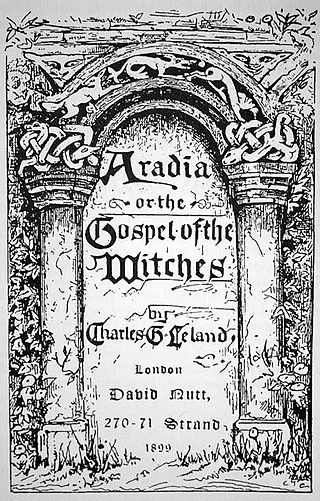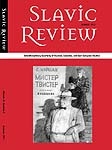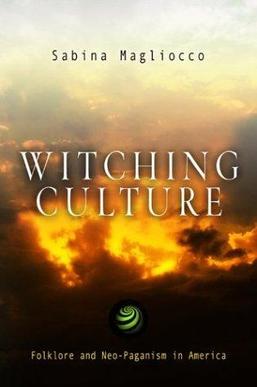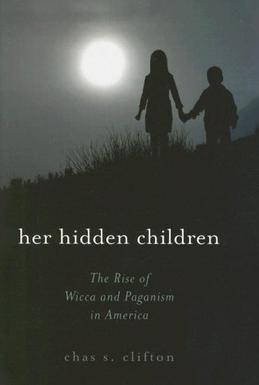
Modern paganism, also known as contemporary paganism and neopaganism, spans a range of new religious movements variously influenced by the beliefs of pre-modern peoples across Europe, North Africa, and the Near East. Despite some common similarities, contemporary pagan movements are diverse, sharing no single set of beliefs, practices, or religious texts. Scholars of religion may study the phenomenon as a movement divided into different religions, while others study neopaganism as a decentralized religion with an array of denominations.

Ronald Edmund Hutton is an Indian-born English historian specialising in early modern Britain, British folklore, pre-Christian religion, and modern paganism. A professor at the University of Bristol, Hutton has written over a dozen books, often appearing on British television and radio. He held a fellowship at Magdalen College, Oxford, and is a Commissioner of English Heritage.

Drawing Down the Moon: Witches, Druids, Goddess-Worshippers, and Other Pagans in America Today is a sociological study of contemporary Paganism in the United States written by the American Wiccan and journalist Margot Adler. First published in 1979 by Viking Press, it was later republished in a revised and expanded edition by Beacon Press in 1986, with third and fourth revised editions being brought out by Penguin Books in 1996 and then 2006 respectively.

Aradia, or the Gospel of the Witches is a book composed by the American folklorist Charles Godfrey Leland that was published in 1899. It contains what he believed was the religious text of a group of pagan witches in Tuscany, Italy, that documented their beliefs and rituals. Historians and folklorists have disputed the existence of such a group. During the 20th century, the book was influential in the development of the contemporary Pagan religion of Wicca.

Philip Heselton is a retired British conservation officer, a Wiccan initiate, and a writer on the subjects of Wicca, Paganism, and Earth mysteries. He is best known for two books, Wiccan Roots: Gerald Gardner and the Modern Witchcraft Revival and Gerald Gardner and the Cauldron of Inspiration, which gather historical evidence surrounding the New Forest coven and the origins of Gardnerian Wicca.

The Slavic Review is a major peer-reviewed academic journal publishing scholarly studies, book and film reviews, and review essays in all disciplines concerned with "Eastern Europe, Russia, the Caucasus, and Central Asia, past and present". The journal's title, though pointing to its roots in Slavic studies, does not fully encompass the range of disciplines represented or peoples and cultures examined.
Chas S. Clifton is an American academic, author and historian who specialises in the fields of English studies and Pagan studies. Clifton currently holds a teaching position in English at Colorado State University-Pueblo, prior to which he taught at Pueblo Community College.

A nature religion is a religious movement that believes nature and the natural world is an embodiment of divinity, sacredness or spiritual power. Nature religions include indigenous religions practiced in various parts of the world by cultures who consider the environment to be imbued with spirits and other sacred entities. It also includes modern Pagan faiths, which are primarily concentrated in Europe and North America.
The Witchcraft Research Association was a British organisation formed in 1964 in an attempt to unite and study the various claims that had emerged of surviving remnants of the so-called Witch-Cult, such as those of Gerald Gardner, Robert Cochrane, Sybil Leek, Charles Cardell, and Raymond Howard.

Religious Studies is a peer-reviewed academic journal published by Cambridge University Press. It addresses problems of the philosophy of religion in the context of a variety of religious traditions. Issues were published approximately biannually from the journal's founding in 1965 until 1969, and have been quarterly since 1970.

The Triumph of the Moon: A History of Modern Pagan Witchcraft is a book of religious history by the English historian Ronald Hutton, first published by Oxford University Press in 1999. At the time, Hutton was a Reader in History at Bristol University, and had previously published a study of ancient pre-Christian religion, The Pagan Religions of the Ancient British Isles (1991) as well as studies of British folk customs and the Early Modern period.

A Community of Witches: Contemporary Neo-Paganism and Witchcraft in the United States is a sociological study of the Wiccan and wider Pagan community in the Northeastern United States. It was written by American sociologist Helen A. Berger of the West Chester University of Pennsylvania and first published in 1999 by the University of South Carolina Press. It was released as a part of a series of academic books entitled Studies in Comparative Religion, edited by Frederick M. Denny, a religious studies scholar at the University of Chicago.
Pagan studies is the multidisciplinary academic field devoted to the study of modern paganism, a broad assortment of modern religious movements, which are typically influenced by or claiming to be derived from the various pagan beliefs of premodern Europe. Pagan studies embrace a variety of different scholarly approaches to studying such religions, drawing from history, sociology, anthropology, archaeology, folkloristics, theology and other religious studies.

Modern Paganism in World Cultures: Comparative Perspectives is an academic anthology edited by the American religious studies scholar Michael F. Strmiska which was published by ABC-CLIO in 2005. Containing eight separate papers produced by various scholars working in the field of Pagan studies, the book examines different forms of contemporary Paganism as practiced in Europe and North America. Modern Paganism in World Cultures was published as a part of ABC-CLIO's series of books entitled "Religion in Contemporary Cultures", in which other volumes were dedicated to religious movements like Buddhism and Islam.

Pagan Theology: Paganism as a World Religion is a taxonomical study of various world religions which argues for a new definition of the word "paganism". It was written by American religious studies scholar Michael York of Bath Spa University and first published by New York University Press in 2003.

Witching Culture: Folklore and Neo-Paganism in America is a folkloric and anthropological study of the Wiccan and wider Pagan community in the United States. It was written by the American anthropologist and folklorist Sabina Magliocco of California State University, Northridge and first published in 2004 by the University of Pennsylvania Press. It was released as a part of a series of academic books titled 'Contemporary Ethnography', edited by the anthropologists Kirin Narayan of the University of Wisconsin and Paul Stoller of West Chester University.

Enchanted Feminism: The Reclaiming Witches of San Francisco is an anthropological study of the Reclaiming Wiccan community of San Francisco. It was written by the Scandinavian theologian Jone Salomonsen of the California State University, Northridge and first published in 2002 by the Routledge.

Nature Religion Today: Paganism in the Modern World is an academic anthology edited by the British religious studies scholars Joanne Pearson, Richard H. Roberts and Geoffrey Samuel which was published by Edinburgh University Press in 1998. Containing fourteen separate papers produced by various scholars working in the field of Pagan studies, the book examines different forms of contemporary Paganism as practiced in Europe and North America.

Her Hidden Children: The Rise of Wicca and Paganism in America is a historical study of Wicca and Contemporary Paganism in the United States. It was written by the American academic Chas S. Clifton of Colorado State University-Pueblo, and published by AltaMira Press in 2005.
Graham Harvey is an English religious studies scholar. He specialises in modern Paganism, indigenous religions and animism.
















